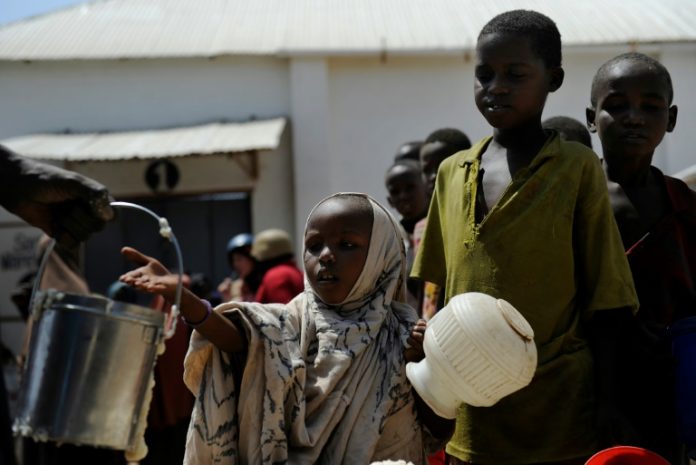Kenya is urging the UN to list Al-Shabaab under the same sanctions as Al-Qaeda and the Islamic State, but foreign donors say the move could leave millions in drought-stricken Somalia without aid.
The proposed listing – which could take effect as soon as Thursday – comes at a critical time in Somalia, where 2.2 million people, or nearly 18 percent of the population, face the risk of severe hunger.
Al-Shabaab is already targeted under broader sanctions imposed by the United Nations on Somalia, which is heavily aid-dependent after three decades of conflict and economic ruin.
Right now, UN agencies and humanitarian organisations are exempt from these sanctions, which enables them to deliver urgent aid without prosecution when they venture into territory controlled by Al-Shabaab.
But Kenya wants to tighten the screws on the jihadist group after several deadly attacks on its soil, and the sanctions regime it proposes would remove that safeguard.
“A measure like this will have the effect of criminalising humanitarian aid,” Eric Schwartz, president of Refugees International, told media.
“Any measure that would impact the current provision of aid would have extremely serious and substantial implications.”
If no member state objects before August 29 the Al-Shabaab listing under Security Council resolution 1267 will take immediate effect.
Hundreds of millions of aid dollars for Somalia will then be thrown into doubt.
In some cases, foreign donors said they may need to freeze payments for up to a year as they consider how to comply with the new sanctions, said an aid source in New York liaising with the UN on the issue.
“We would be operating in a huge grey area. As humanitarian actors, we would have this huge dilemma of carrying on providing aid, or we stop altogether,” the official working for a large global charity told reporters on condition of anonymity.
Another concern is that banks, fearing repercussions, could limit financial services to humanitarian agencies working in Somalia – a process known as “de-risking” that makes it difficult to transfer money and fund programmes.
The looming deadline has sparked a flurry of lobbying at Security Council headquarters in New York.
Earlier this month, 20 former ambassadors, national security and humanitarian officials wrote to US Secretary of State Mike Pompeo, Treasury Secretary Steven Mnuchin and USAID administrator Mark Green urging them to reject the Kenyan proposal.
Their decision “could either help sustain critical and life-saving relief to Somalia, or exacerbate the dire humanitarian situation and puts hundreds of thousands if not millions of people at grave risk”, the August 7 letter warned.
“They (humanitarian groups) have worked carefully to develop systems to reach people while limiting aid diversion” to Al-Shabaab, it added.
Exemptions from sanctions are extremely rare, the International Peace Institute pointed out in a June paper.
Kenya sees Al-Shabaab as no different to extremist groups elsewhere and believes sanctions are a way to blunt their violence.
On July 13, after 26 people were killed in Somalia’s south, Kenyan Foreign Minister Monica Juma said “this attack was another reminder to the international community of the imperative” to list Al-Shabaab under resolution 1267.
Al-Shabaab violence has surged in 2019 with atrocities in Somalia and Kenya, including an attack in Nairobi in January that left 21 people dead.
Kenya has applied considerable diplomatic leverage on its allies, notably lobbying the EU in May to list the Al-Shabaab as a “terrorism organisation”.
The timing could not be worse for Somalia, which is facing another hunger crisis after the rainy season failed this year.
Nearly 18 percent of the population faces severe hunger, the UN’s Food and Agriculture Organization (FAO) has warned.
The country is prone to devastating, frequent droughts. A famine between October 2010 and April 2013 killed almost 258,000 people, more than half of them children under five.
Somalia has accused its larger neighbour of meddling that could worsen its domestic problems and have repercussions for regional stability.
Somalia’s envoy to the UN, Abukar Dahir Osman, told the Security Council on August 21 that impeding aid efforts “will play into the Shabaab’s narrative and self-image as a de-facto government in areas where state reach is limited”.

He reiterated the government’s “condemnation of any interference in the internal affairs of Somalia.”
Kenya’s campaign on Al-Shabaab comes as it spars with Somalia on several diplomatic fronts including a battle over its marine borders, said Matt Bryden, director of Nairobi-based think tank Sahan.
“There’s a range of thorny issues between the two governments that have strained their relations to the breaking point, and I think Kenya’s move must be understood in that wider context,” he told media.
















